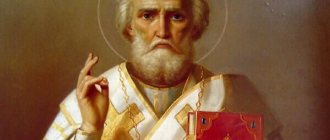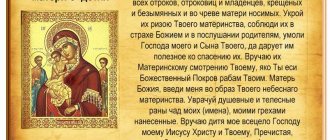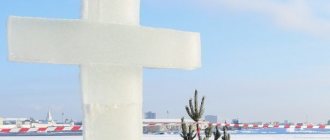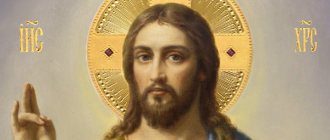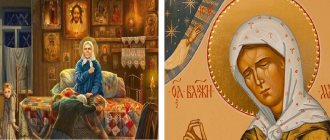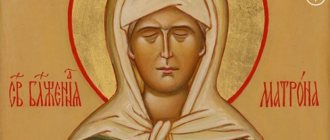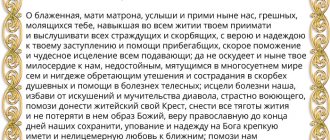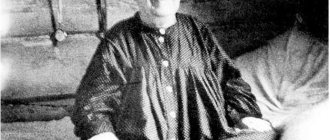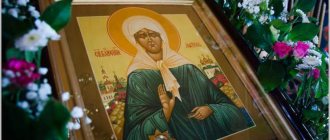What miracles should you expect if the Day of Remembrance of Matrona of Moscow falls on Easter?
Matrona of Moscow is one of the most revered saints in Orthodoxy. May 2 is the day of remembrance of Blessed Matrona.
This holiday is not one of the twelve, but it is very important for believers. The fact is that Matronushka helped people throughout her life. She was born blind, but from childhood she had the gift of foresight and healing. She has helped thousands of people throughout her life.
She was canonized only in 1999, 47 years after her death. On May 2, many people go to the Intercession Monastery in Moscow to pray to Matrona there. On this day, the saint’s grave is strewn with flowers, which she adored during her lifetime and which she loved to accept as gifts for her help.
Orthodox calendar for May 5, 2022
Bright Week
St.
Theodora Sikeota, bishop. Anastasiupolsky (613). Mch. Epipodium of Lyons (c. 177). St. Vitaliy (609-620). Transfer of the relics of the blgv. book Vsevolod, in the Holy Baptism of Gabriel, Pskov (1834). Sschmch. Eustathius the presbyter (1918). Mch. Demetrius (1942). Cathedral of New Martyrs in Butovo victims. App. Nathanael, Luke and Clement (I). Sschmch. Plato, ep. Banyaluksky (1941). Icon of the Mother of God: Kasperovskaya (rolling celebration on Wednesday of Bright Week).
Birthday people - Happy Angel Day!
Holy Bible
Acts 2:22-36. In. 1:35-51
The next day John and two of his disciples stood again. And when he saw Jesus coming, he said, Behold the Lamb of God. Hearing these words from him, both disciples followed Jesus. Jesus turned and saw them coming and said to them, “What do you need?” They said to Him: Rabbi, which means teacher, where do you live? He says to them: go and see. They went and saw where He lived; and they stayed with Him that day. It was about ten o'clock. One of the two who heard from John about Jesus and followed Him was Andrew, the brother of Simon Peter. He first finds his brother Simon and says to him: we have found the Messiah, which means: Christ; and brought him to Jesus. Jesus looked at him and said, “You are Simon, the son of Jonah; you will be called Cephas, which means stone (Peter). The next day Jesus wanted to go to Galilee, and he found Philip and said to him: follow me. Philip was from Bethsaida, from the same city as Andrew and Peter. Philip finds Nathanael and says to him: We have found the One about whom Moses in the law and the prophets wrote, Jesus the son of Joseph from Nazareth. But Nathanael said to him: Can anything good come from Nazareth? Philip says to him: come and see. Jesus, seeing Nathanael coming to Him, said of him: Behold, truly an Israelite, in whom there is no guile. Nathanael says to Him: Why do You know me? Jesus answered and said to him, “Before Philip called you, when you were under the fig tree, I saw you.” Nathanael answered Him: Rabbi! You are the Son of God, You are the King of Israel. Jesus answered and said to him, “You believe because I said to you: I saw you under the fig tree; you will see more of this. And he said to him, “Truly, truly, I say to you, from now on you will see heaven open and the angels of God ascending and descending on the Son of Man.”
Prayer on the Day of the Holy Trinity: three texts
Of course, sometimes circumstances are such that even on a bright holiday we cannot be in church for worship. However, this is not a reason to refuse to communicate with God and read the Bible.
Moreover, on the feast of the Holy Trinity, prayer acquires a special sacred meaning. It is directed to the Holy Spirit, who descended to earth according to the promise of Christ on the 50th day after Easter (June 20, 2021, June 12, 2022, June 4, 2023, etc.).
Appeals to God are distinguished by their sublimity and reverent feelings, which, of course, purify a person and help him feel the true meaning of this great holiday. If there are no physical limitations or health issues, it is better to turn to the Almighty on your knees - these are the kneeling prayers that are said on Trinity Sunday in churches.
It is interesting that from Easter until Pentecost it is not recommended to kneel, because all these days are bright - we rejoice at the resurrection of the Lord. And on Trinity, kneeling, of course, does not mean mourning. This is simply an image of our special reverence for the third person of the Trinity - the Holy Spirit.
Here are 3 prayers you can read on Trinity Sunday at home:
First prayer for Trinity
Second prayer for Trinity
Third prayer for Trinity
IS IT POSSIBLE TO PRAY IN YOUR OWN WORDS
Yes, it's definitely possible. The Bible nowhere contains any specific requirements or, much less, categorical prohibitions on prayer. Perhaps many people would not like to find themselves in an awkward situation: they believe that tongue-tiedness, poor language, and soft speech prevent them from communicating with God.
However, it is important to understand that there are no bad prayers. If an appeal to the Lord is filled with a sincere impulse, it will definitely be heard. Whether a lot of time passes or a little, you just need to trust the Almighty.
Or, as they say, let go of a problematic situation: after all, having prayed, we have already entrusted it to someone who knows and can do much more than all of us put together.
Venerable Theodore Sikeot
The Monk Theodore Sikeot lived in the middle of the sixth century.
He received his second name from the name of his native village - Sikei, near the city of Anastasiupol in Asia Minor. Theodore's whole life was connected with the Great Martyr George and his prayerful intercession. When the boy was six years old, his mother decided to give him a golden belt so that Theodore would become a brave warrior. But the Great Martyr George appeared to her, who revealed to the woman that Theodore was destined for the path of serving the Lord. At the age of fourteen, the young man left home and dug himself a cave not far from the temple of St. George. He took monastic vows in Jerusalem. Theodore returned to his homeland and continued to live at the church of the Great Martyr George. He fasted a lot, loved prayerful solitude and did not seek the company of people. But it soon became known that through the prayer of Hieromonk Theodore, healings were taking place, and what he predicted was coming true. People flocked to the small church. The residents of Anastasiupol begged Theodore to become their bishop. The righteous man was burdened by this burden and soon abandoned it, but first he served the Church a lot. According to legend, he left a prophecy about the disaster that awaited the empire - the heresy of iconoclasm. It came true - for more than a hundred years the authorities in Byzantium forbade the veneration and preservation of holy icons.
Traditions and customs of May 5th
In the calendar at the beginning of May, Saint Theodora is mentioned in a row:
- On May 3, the Venerable Theodore Vlasyanichnik is venerated;
- On May 4, the memory of the martyr Theodore of Perga is honored;
- May 5 – Venerable Theodore Sikeot, Bishop of Anastasioupol.
One belief and saying applies to all these saints: For Fyodor, the dead yearn for the earth. On the days of remembrance of Saint Theodore, they visited the churchyard and commemorated their deceased relatives.
On this day, a prayer service was served to the Monk Vitaly and they prayed for protection from carnal passion.
May 5th is better known in the popular calendar as Luke's Day, or Onion Day. This spring, the peasants were running out of almost all their supplies. This fact is emphasized by one of the sentences:
There is neither bread nor flour on Luke.
The peasants associated the name of the saint with daily garden work, and dedicated the day of his memory to onions - the most important herbaceous plant, without which neither the everyday nor the holiday table of our ancestors could do. In the old days, it was believed that onions filled the body with energy and gave a person courage and strength. Therefore, it was often added to warrior dishes. They also firmly believed that the specific smell of onions warded off illnesses and protected against them. During the epidemic, tight bunches of onions were hung in every house. The plant is rich in mineral salts of calcium, potassium, phosphorus and magnesium. In addition, onions contain volatile substances - phytoncides, which fight pathogenic and putrefactive bacteria.
Onions are especially valued for their healing qualities. It is used in the treatment of runny nose, sore throat, suppurative processes in the lungs, burns, and cough. Regular consumption of onions helps reduce blood sugar and cholesterol. A decoction of onion peels is used in the treatment of cystitis, as well as to strengthen hair.
In the old days, they took planting onions seriously and always planted them in large quantities so that they would last throughout the winter.
When planting onions, they read special spells, believing that thanks to them they would be able to reap a good harvest. While reading the plot, the onions were kept in the hem and then planted in the garden:
Before leaving the house and going to the garden, they stepped on the left with their right foot and said:
“I will give to the land, and it will give it to me, and no one will stop me from doing this. Amen".
On the eve of St. George's Day (May 6), the “Lala” ritual was performed, which was used to “cherish” the fine weather. Around the apple tree the girls danced in circles and sang songs. The most beautiful girl, Lyalya, was tied with greenery and ribbons, and a wreath of fresh wildflowers was placed on her head. Then Lyalya was seated on a bench and danced around her.
Usually at this time you can hear the cuckoo for the first time. When you hear the cuckooing, take out your wallet, shake it and say:
“Like a cuckoo will crow all summer long,
So the money will come to me.
Key, lock, tongue. Amen".
The life and works of the apostles – Holy Apostle Bartholomew (Nathanael)
The Holy Apostle Bartholomew (from among the 12 apostles of Christ) was from Cana of Galilee. After the Descent of the Holy Spirit on the day of Pentecost, he and the Apostle Philip (November 14) were given the lot of preaching the Gospel in Syria and Asia Minor. While preaching the gospel, they dispersed to different cities and then came together again. The Holy Apostle Philip was accompanied by his sister, the virgin Mariamne. Passing through the cities of Syria and Mysia, they suffered many sorrows and misfortunes, they were stoned and imprisoned. In one of the villages they met the Apostle John the Theologian and together they went to Phrygia. In the city of Hierapolis, by the power of their prayers, they destroyed a huge echidna, which the pagans worshiped as a deity. The holy apostles Bartholomew and Philip and their sister confirmed their preaching with many signs.
In Hierapolis there lived a man named Stachios, who was blind for 40 years. When he received healing, he believed in Christ and was baptized. The rumor about this spread throughout the city, and many people flocked to the house where the apostles lived. The sick and possessed were freed from their ailments, and many were baptized. The governor of the city ordered the preachers to be seized and thrown into prison, and the house of Stachys to be burned. At the trial, the pagan priests complained that foreigners were turning the people away from worshiping their native gods. Believing that magical power lay in the clothes of the apostles, the ruler ordered them to be torn off. The Virgin Mariamne appeared in their eyes like a fiery torch, and no one dared to touch her. The saints were sentenced to crucifixion. The Apostle Philip was lifted up to the cross upside down. An earthquake began, the opening of the earth swallowed up the ruler of the city, the priests and many people. Others were frightened and rushed to take the apostles down from the cross. Since the Apostle Bartholomew was hung low, he was removed quickly. The Apostle Philip died. Having installed Stachy as bishop of Hierapolis, Apostle Bartholomew and blessed Mariamne left this city.
Preaching the Word of God, Mariamne went to Lycaonia, where she died peacefully (her memory is February 17). The Apostle Bartholomew went to India, there he translated the Gospel of Matthew from Hebrew into the local language and converted many pagans to Christ. He also visited Greater Armenia (the country between the Kura River and the upper reaches of the Tigris and Euphrates rivers), where he performed many miracles and healed the demon-possessed daughter of King Polymius. In gratitude, the king sent gifts to the apostle, but he refused to accept them, saying that he was only looking for the salvation of human souls. Then Polymios, the queen, the healed princess, and many of her relatives accepted Baptism. Residents of ten cities of Greater Armenia followed their example. Through the machinations of pagan priests, the king's brother Astyages seized the apostle in the city of Alban (now the city of Baku) and crucified him upside down. But even from the cross he did not stop proclaiming to people the good news about Christ the Savior. Then, by order of Astyages, they tore off the apostle’s skin and cut off his head. The believers placed his remains in a tin shrine and buried him. Around 508, the holy relics of the Apostle Bartholomew were transferred to Mesopotamia, to the city of Dara. When the Persians captured the city in 574, Christians took the relics of the apostle and retired to the shores of the Black Sea. But since they were overtaken by enemies, they were forced to lower the crayfish into the sea. By the power of God, the crayfish miraculously sailed to the island of Liparu. In the 9th century, after the capture of the island by the Arabs, the holy relics were transferred to the Neapolitan city of Benevento, and in the 10th century some of them were transferred to Rome.
The holy Apostle Bartholomew is mentioned in the life of Joseph the hymnographer († 883, commemorated April 4). Having received from one person part of the relics of the Apostle Bartholomew, the Monk Joseph brought them to his monastery near Constantinople and built a church in the name of the Apostle, in which he placed part of his relics. The Monk Joseph was eager to compose hymns of praise in honor of the saint and earnestly prayed to God to grant him the ability to compose them. On the day of memory of the Apostle Bartholomew, the Monk Joseph saw him at the altar. He called Joseph, took the Holy Gospel from the throne and laid it on his chest with the words: “May the Lord bless you, may your songs delight the universe.” From that time on, the Monk Joseph began to write hymns and canons and with them he decorated not only the feast of the apostle, but also the days of remembrance of many other saints, compiling about 300 canons. Saints John Chrysostom, Cyril of Alexandria, Epiphanius of Cyprus and some other teachers of the Church consider the Apostle Bartholomew to be one person with Nathanael (John 1:45-51, 21:2).
September 7 (August 25, Old Style) – transfer of relics
The transfer of the relics of the Apostle Bartholomew took place at the end of the 6th century. His apostolic activity and martyrdom are remembered by the Church on June 11. Apostle Bartholomew suffered for Christ in Armenian Alban (now Baku) in 71, where his holy relics were located. Numerous miracles occurred from the relics of the holy apostle, and many infidels turned to Christ. Under Emperor Anastasia (491–518), the relics of the Apostle Bartholomew were brought to the newly built city of Anastasioupol (or Dara) and remained there until the end of the 6th century.
When the city of Anastasiupol was captured by the Persian king Khosroes, Christians, taking the ark with the relics of the Apostle Bartholomew, fled with it to the shores of the Black Sea. The priests who overtook them threw the ark with the relics of the Apostle Bartholomew into the sea. Together with him, 4 more arks with the relics of the holy martyrs Papian, Lucian, Gregory and Acacius were thrown into the sea. By the power of God, the arks did not drown in the depths of the sea, but made a miraculous voyage across the seas and reached Italy. The ark with the relics of the Apostle Bartholomew landed on the shore near the island of Lipara, and the rest of the arks continued on their way and landed on the shore in different places in Italy. The ark with the relics of the martyr Papian stopped in Sicily, the martyr Lucian in Messina, the martyr Gregory in Calabria and the martyr Acacius in Asculus. The arrival of the holy relics of the Apostle Bartholomew was revealed to the bishop of the island of Lipara, Agathon, who went with the clergy to the seashore, took the ark from the water and solemnly transferred it to the church. From the relics of the Apostle Bartholomew, myrrh flowed, providing healing from various diseases. The holy relics remained in the church of the island of Lipara until the middle of the 9th century. When the island was captured by pagans, Christian merchants took the holy relics of the Apostle Bartholomew and transported them to the city of Benevento, where they were received with great honor and placed in the main church of the city.
Prayers during the Nativity Fast
From November 28, 2022 to January 6, 2022, Orthodox believers will observe the Nativity Fast. This is a period of not only abstinence in food, but also spiritual cleansing.
Attending church, fervent prayers, and avoiding entertainment activities help create a special emotional mood these days.
We will talk about what dietary restrictions believers should adhere to and what prayers to read during the Nativity Fast from November 28, 2021 to January 6, 2022.
At this time, animal products (meat, eggs, milk, butter, cheese, etc.) are excluded from the diet, but fish can be eaten on Saturdays and Sundays, as well as on major holidays.
The New Year, which is celebrated from December 31 to January 1, is not a church holiday, and on this night believers need to adhere to the same diet as on ordinary days.
On January 2-6, on the eve of the bright holiday of Christmas, fasting becomes stricter. At this time, fasting is recommended to eat dry food. It is no longer possible to include fish in the menu, and strong alcoholic drinks are prohibited.
On January 6, 2022, on Christmas Eve, the eve of the Nativity of Christ, many people completely refuse food and start eating only after the first star appears in the sky.
This tradition is associated with the legend of the appearance of the Star of Bethlehem, which announced the birth of Christ. Families gather at the festive table, which is served with ritual dishes.
How to pray correctly during the Nativity Fast in 2022?
Every day, including before meals, you need to read the Lord’s Prayer:
“Our Father, who art in heaven! Hallowed be Thy name, Thy kingdom come, Thy will be done, as it is in heaven and on earth. Give us this day our daily bread; and forgive us our debts, just as we forgive our debtors; and lead us not into temptation, but deliver us from evil.”
You can supplement the prayer with the following words:
“Grant me, O Lord, protection from satiety and gluttony, allow me to accept Your blessed gifts, so that, having tasted them, I may be strengthened in spirit and body and serve for Your glory.”
Prayer during the Nativity Fast after the meal
“We thank You, Christ God, for feeding us with Your earthly blessings; do not deliver us from the Kingdom of God, but as You, Savior, appeared among the disciples, come to us and save us.”
Evening prayer during the Nativity Fast for every day
“Eternal and merciful God, forgive me the sins I have committed in deed, speech or thought. Grant, Lord, to my humble soul cleansing from all filth. Grant me, O Lord, a restful sleep at night, so that in the morning I may again serve Your Most Holy Name. Deliver me, Lord, from vanity and dashing thoughts. For this is Thy power and Thy kingdom, now and ever and unto ages of ages. Amen".
In addition to the prayers performed daily during the Nativity Fast, try to read the Holy Scriptures as often as possible, in particular, passages from the Gospel that are heard on different days of Lent in churches (you can find out what these stories are by referring to the church calendar).
What other prayers are read at home during the Nativity Fast?
There are several important holidays on these days:
- Presentation of the Blessed Virgin Mary into the Temple (December 4),
- Day of St. Nicholas the Wonderworker (December 19),
- Day of the Apostle Andrew the First-Called (December 13),
- Day of Barbara the Martyr (December 17),
- Memorial Day of St. Spyridon of Trimifunt (December 25), etc.
At this time, Orthodox Christians receive communion in churches. To prepare for such an event, the church canons of repentance should be read on Saturday, and after communion, the canon of thanksgiving should be read. You can also read canons, akathists and prayers to saints.
How to pray correctly during the Nativity Fast?
This must be done with a pure soul and heart, because prayer is your sincere conversation with the Almighty! Prayers can be read both in church and at home.
Take a break from everyday affairs and light a candle in front of the icon, tune in to the appropriate mood. Sign yourself three times with the sign of the cross, make several bows or bows to the ground and say the words of prayer. They should come not only from your lips, but also from your heart.
What prayers should you read on Christmas night? On January 6th, believers celebrate Christmas Eve. Many people try to go to church or pray at home.
“Lord Jesus Christ our God, who deigned for our salvation to appear on earth in the flesh and be indescribably born of the Unknown and Most Pure Virgin Mary! We thank Thee, for Thou hast vouchsafed us, having purified ourselves through the feat of fasting, to achieve the great feast of Thy Nativity and in spiritual joy to sing praises to Thee with the angels, to praise Thee with the shepherds, and to worship Thee with the wise men. We thank You, for through Your great mercy and immeasurable condescension towards our weaknesses, You now console us not only with abundant spiritual food, but also with a festive meal.”
“At the same time, we pray to You, who opens Your generous hand, fills all living things with Your blessings, gives everyone food in accordance with the times and rules of the Church, bless the festive foods prepared by Your faithful people, especially this, from them, in obedience to the Charter of Your Church, in the past days of fasting Thy servants abstained, so that those who eat them with thanksgiving will be in health, in strengthening their bodily strength, in joy and joy. May all of us, having every contentment, abound in good deeds, and from the fullness of a grateful heart glorify Thee, who nourishes and comforts us, together with Thy Beginning Father and the Most Holy Spirit forever and ever. Amen".
In the evening of Christmas Eve, a solemn service begins, which lasts all night, connecting with the solemn morning liturgy. At the end of the liturgy and the following vespers, a candle is brought into the center of the church, and the priests sing the troparion to the Nativity of Christ before it.
Troparion, tone 4 “Thy Nativity, O Christ our God, rise up into the world’s light of reason: in it, for those who serve the stars, learning from the star, bow to Thee, the Sun of righteousness, and lead thee from the heights of the East: Lord, glory to Thee.” (Translation: “Thy birth, Christ our God, shone for the world with the light of knowledge. For during it those who served the stars were taught by the star to worship Thee, the Sun of righteousness, and to know Thee, the East from above. Lord, glory to Thee!”).
Kontakion, tone 3 “Today a virgin gives birth to the Most Essential, and the earth brings a den to the Unapproachable: angels with shepherds glorify, and wolves travel with a star: for for our sake the Young Child, the Eternal God, was born.” (Translation: “Today the Virgin gives birth to the Supreme Being and the earth brings a cave to the Unapproachable; the angels glorify with the shepherds, the Magi travel with the star; for for our sake the young Youth, the Eternal God, was born”).
Greatness “We magnify You, Life-Giving Christ, for our sake now born in the flesh from the brideless and Most Pure Virgin Mary.”
Deserver, voice 1 “Glorify, my soul, the most honorable and most glorious of the hosts of the mountains, the Most Pure Virgin Mary. It is more convenient for us to love, as if we are comfortable with fear, in silence, but for love, O Virgin, weaving long-form songs is inconvenient: but also, Mother, give us strength, if there is will.”
Martyr Epipodius of Lyons
After the Descent of the Holy Spirit on the Apostles, Christ's disciples spread the news of the Savior to the farthest corners of the Roman Empire. Christian communities began to emerge in all provinces, including Gaul and modern France. Its capital was Lyon, then called Lugdunum. Christians were treated with caution - after all, they did not participate in the cult of the emperor, who was revered as a deity in Rome. Rumors began to circulate about their mysterious rituals. Society displaced and persecuted Christians, and the authorities of Rome unleashed real persecution. In 1777, Lyon believers became their victims.
Epipodium and his friend Alexander were young men from wealthy families. They had a deep friendship. They grew up together, came to the Christian community together and were baptized. When a real roundup began against Christians, the young men fled in fear from Lugdunum and took refuge in the suburbs of a widow. However, they were found and imprisoned. Epipodium was the first to stand trial. He boldly confessed his faith and said: “The torment that we suffer from you allows us to move from time to eternity, from the poverty of mortal life to the happiness of life over which death has no power.” Epipodium was sentenced to death. The next day his friend Alexander also died. The relics of the saints are kept in the crypt of the Church of St. Irenaeus in Lyon.
Prayers for Easter 2022 what to read
If you follow a prayer rule according to a prayer book, it is worth considering that after Easter the order of prayers changes. Prayers for Easter are read in a special order. On Bright Week, morning and evening prayers are not read, and after that some prayers customary before Easter are replaced by others.
Prayer of Ephraim the Syrian
The prayer of Ephraim the Syrian is read before Easter and during Lent.
Lord and Master of my life, do not give me the Spirit of idleness, despondency, covetousness and idle talk. Grant the spirit of chastity, humility, patience and love to me, Your servant. Hey, Lord, King! Grant me to see my sins, and not to condemn my brother, for blessed art thou unto the ages of ages.
Amen.
The prayer of Ephraim the Syrian is read twice at the end of each Lenten service from Monday to Friday (it is not read on Saturdays and Sundays, since the services of these two days differ from the general Lenten order). At the first reading of this prayer, a prostration is made after each petition. Then the prayer is read to oneself 12 times: “God, cleanse me, a sinner,” with bows from the waist. Then the entire prayer of Ephraim the Syrian is read again, after which one bow to the ground is made.
Christ is risen from the dead
The prayer Christ is Risen from the Dead is read on Easter. The Feast of the Ascension occurs 40 days after Easter. During this period, it is customary to begin all prayers with the Troparion of Easter:
“Christ is risen from the dead, trampling down death by death, and giving life to those in the tombs.” (Thrice)
“Having seen the Resurrection of Christ, let us worship the holy Lord Jesus, the only sinless one. We worship Thy Cross, O Christ, and we sing and glorify Thy holy resurrection: for Thou art our God, do we know no other to Thee, we call Thy name.”
“Come, all you faithful, let us worship the holy resurrection of Christ: behold, through the Cross joy has come to the whole world. Always blessing the Lord, we sing of His resurrection: having endured crucifixion, destroy death by death.” (Read three times)
Before the Ascension, the prayer “Heavenly King” is not read, since it is addressed to the Holy Spirit.
In the first week after Easter, instead of morning and evening prayers, the Easter hours are read.
Instead of the prayer “It is worthy to eat,” the Easter service is read.
Honorer of Easter
“The angel cried out with grace: Pure Virgin, rejoice! And again the river: Rejoice! Your Son is risen three days from the grave and raised up the dead; people, have fun! Shine, shine, new Jerusalem, for the glory of the Lord is upon you. Rejoice now and be glad, O Zion. You, Pure One, show off, O Mother of God, about the rising of Your Nativity.”
Also, before the Feast of the Ascension of the Lord, instead of the “Our Father” prayer, the Easter troparion “Christ is Risen from the Dead” is read before meals. After the meal, instead of “We thank you,” the honorific “Angel is crying.”
Easter Clock
Troparion:
Christ rose from the dead, trampling down death and giving life to those in the tombs. (Thrice)
Having seen the Resurrection of Christ, let us worship the holy Lord Jesus, the only Sinless One. We worship Your Cross, O Christ, and we sing and glorify Your holy Resurrection. For You are our God, don’t we know anything else; We call Your name. Come, all you faithful, let us worship the holy Resurrection of Christ: behold, through the Cross joy has come to the whole world. Always blessing the Lord, we sing His Resurrection: having endured crucifixion, destroy death through death. (three times)
Ipakoi:
Having anticipated the morning of Mary, and having found the stone rolled away from the tomb, I heard from the Angel: in the light of the ever-present Being, with the dead, why are you looking for a man? You see the graveclothes, and preach to the world that the Lord has risen, the one who put death to death, as the Son of God, saving the human race.
Kontakion:
Even though you descended into the grave, Immortal, you destroyed the power of hell, and you rose again as the Conqueror, Christ God, telling the myrrh-bearing women: Rejoice!, and grant peace to your apostles, grant resurrection to the fallen.
In the tomb carnally, in hell with the soul like God, in paradise with the thief, and on the Throne you were, Christ, with the Father and the Spirit, fulfilling everything, indescribable.
Glory to the Father and the Son and the Holy Spirit: Like the Life-Bearer, like the reddest of Paradise, truly the brightest palace of every king has appeared, O Christ, Thy tomb, the source of our Resurrection.
And now and ever and unto ages of ages. Amen: Most sanctified Divine village, rejoice: for you have given joy, O Theotokos, to those who call: blessed art thou among women, O All-Immaculate Lady.
Lord have mercy. (40 times)
Glory to the Father and the Son and the Holy Spirit, now and ever, and unto ages of ages. Amen:
The most honorable Cherub and the most glorious without comparison Seraphim, who gave birth to God the Word without corruption, the real Mother of God, we magnify Thee.
Christ rose from the dead, trampling down death by death and giving life to those in the tombs. (three times)
Through the prayers of our holy fathers, Lord Jesus Christ, have mercy on us. Amen.
Venerable Vitaly of Alexandria
The Monk Vitaly of Alexandria lived at the turn of the sixth and seventh centuries. He was a monk in Alexandria. This bustling port, a crossroads of civilizations, attracted honest traders and travelers, as well as rogues and robbers. Like any large city, there was a cheerful quarter for sailors. And so the monk Vitaly, who was already over sixty years old, took upon himself an unusual feat - he prayed for the health of all the inhabitants of the brothels of Alexandria. He entered their names in a special book - a commemoration book. In addition to prayers, he helped women with money. Vitaly worked all day, and in the evening he went to one of the harlots and gave her money, on the condition that she would not engage in her trade that night. At the same time, Vitaly asked the woman not to say anything about his help. But soon various rumors spread throughout the city about a monk disappearing in the city dens. Some priests demanded that Patriarch John of Alexandria expel Vitaly and deprive him of his rank. But he only shamed the slanderers. When Vitaly died, many women gathered at the saint’s cell - nuns, respectable married matrons, artisans and peasant women. They talked about how Vitaly of Alexandria, with his prayers and help, helped them come to repentance and change their lives. And in the hands of the monk they found a scroll with the words “Men of Alexandria, do not judge prematurely, until the Lord, the Righteous Judge, comes.”
Trinity prayers that you can read at home
Of course, sometimes circumstances are such that even on a bright holiday we cannot be in church for worship. However, this is not a reason to refuse to communicate with God and read the Bible.
Questions are often asked about how to pray for Trinity at home, what specific prayers are read on this holiday.
Prayer to the Holy Trinity
Most Holy Trinity, have mercy on us; Lord, cleanse our sins; Master, forgive our iniquities; Holy One, visit and heal our infirmities, for Thy name's sake.
Most Holy Trinity, have mercy on us; Lord, cleanse our sins; Master, forgive our iniquities (violations of God’s law); Holy (Spirit), come and heal our infirmities, for Thy (Holy Trinity) name’s sake.
First prayer on Trinity Day
To the Most Holy Trinity, the Consubstantial Power, all the good Wines that we will reward You for everything that You have rewarded us sinners and unworthy before, before you came into the world, for everything that You have rewarded us every day, and that You have prepared for all of us in the world to come !
It is fitting, then, for so much good deeds and generosity, to thank Thee not just in words, but more than in deeds, for keeping and fulfilling Thy commandments: but we, being aware of our passions and evil customs, have cast ourselves into countless sins and iniquities from our youth.
For this reason, as unclean and defiled, do not just appear before Your Trisholy face without coldness, but below Your Most Holy Name, speak to us, even if You Yourself had deigned, for our joy, to proclaim that the pure and righteous are loving, and sinners who repent are merciful and kindly accept.
Look down, O Divine Trinity, from the height of Your Holy Glory upon us, many sinners, and accept our good will, instead of good deeds; and give us the spirit of true repentance, so that, having hated every sin, in purity and truth, we may live until the end of our days, doing Your most holy will and glorifying Your sweetest and most magnificent name with pure thoughts and good deeds. Amen.
Second prayer
Having risen from sleep, I thank You, Holy Trinity, for for the sake of Your many kindness and long-suffering, You were not angry with me, lazy and sinful, and You destroyed me with my iniquities; But you usually loved mankind, and in the despair of the one who lay down, you raised me up to practice and glorify Your power. And now enlighten my mental eyes, open my lips to learn Thy words, and understand Thy commandments, and do Thy will, and sing to Thee in heartfelt confession, and glorify Thy all-holy name, of the Father and the Son and the Holy Spirit, both now and ever, and forever and ever. Amen.
Prayer to the “Heavenly King”
“Heavenly King, Comforter, Soul of truth, Who is everywhere and fulfills everything, Treasure of good things and Giver of life, come and dwell in us, and cleanse us from all filth, and save, O Good One, our souls.” Translation: “Heavenly King, Comforter (Advisor, Mentor), Spirit of Truth, existing everywhere (located) and filling everything (with His presence), Treasure of blessings and Giver of Life, come and dwell in us, cleanse us from all sin and save us, Most Good One , our souls."
Orthodox Christians often pray in their own words. According to the Bible, there are no strict requirements for reading prayers. The clergy say that there are no bad prayers.
Transfer of the relics of the blessed prince Vsevolod of Pskov, in the baptism of Gabriel
The holy noble prince Vsevolod of Pskov, baptized Gabriel, was the grandson of Vladimir Monomakh and lived in the twelfth century.
He was born in Novgorod, where his father, the holy noble prince Mstislav-Theodore the Great, reigned.
Over time, young Vsevolod became his father's deputy. He granted preferential certificates to the Hagia Sophia and other churches. When a terrible famine struck the region, the prince sacrificed the treasury to save people. They said about Vsevolod that he was a valiant warrior, but he never took up the sword for the sake of self-interest and power. The Novgorodians harbored a grudge against the prince when, according to dynastic laws, he left them to reign in Pereyaslavl. However, Vsevolod quickly returned from there. He wanted to restore relations with Novgorod, but the veche condemned the prince to exile. A few years later, Vsevolod was called to reign by the inhabitants of Pskov. This was the first Pskov prince, elected by the will of the Pskov people themselves. After his death, Vsevolod began to be revered as the heavenly protector of the city. According to legend, his prayerful help saved Pskov from the siege of the troops of Stefan Batory. Today the Church remembers how in one thousand eight hundred and thirty-four the holy relics of the prince were transferred to a new tomb in the Pskov Trinity Cathedral.
Hieromartyr Evstafiy Malakhovsky
Hieromartyr Eustathius Malakhovsky was born in the year one thousand eight hundred and eighty, in the Polotsk province. At the beginning of the twentieth century, Russia was building relations with the lands of Central Asia that had recently become part of the empire. Eustathius volunteered to serve the Fatherland in the Turkestan diocese. Temples for Russian settlers had just begun to be built there. From the year one thousand nine hundred and four, Eustathius served there in the temples and soon accepted the priesthood. He traveled a lot around the region and left interesting notes about the social composition and customs of different waves of Russian settlers in Central Asia. In the sixteenth year, Malakhovsky witnessed the uprising of the Kyrgyz in the Semirechensky region. He was then the rector of the church in the village of Pokrovskoye, not far from Przhevalsk. His memories have been preserved of the heroic defense of the inhabitants of Pokrovsky from six thousand cavalry and of their salvation, which he called a real miracle. Carts of Russian settlers were able to get past the siege of the village and take refuge in the fortress in Przhevalsk. All this time, the priest led the defense and built barricades. And besides, he served liturgy and prayer services, confessed, took communion, and went around the fortifications with a procession of the cross. Just two years later, in the eighteenth, during the Easter religious procession, priest Evstafiy Malakhovsky was killed by a detachment of Red Army soldiers.
Martyr Dimitry Vlasenkov
Martyr Dimitry Vlasenkov was born in one thousand eight hundred and eighty in the Mogilev province, into a peasant family. He became a peasant, got married, then was drafted into the army and finished his service as a non-commissioned officer. All these years he did not leave the temple - he sang in the choir and was a psalm-reader. After the revolution, Dmitry was elected to the church council. In 1934, the temple was closed and the priest was arrested. Vlasenkov, together with other parishioners, began to work for the return of the church, but their efforts were unsuccessful. The peasants often asked Dmitry to come to their home to read the Psalter for the dead. On Radonitsa, when the Church especially commemorates the dead, Vlasenkov went to the cemetery with his fellow villagers. More than two hundred people gathered, the choir sang a dirge. The authorities were unhappy that, despite the closure of the temple and the arrest of the priest, church life in the village did not stop. On the basis of false evidence, Dmitry Vlasenkov was arrested in 1940. He was accused of anti-Soviet agitation and sentenced to five years in the camps. Martyr Demetrius died in the Karaganda camp in 1942, after a serious illness.
Kasperovskaya miraculous icon of the Mother of God
The Kasperovsky miraculous icon of the Mother of God is a great shrine of the cities of Kherson and Odessa, where it remains for about six months a year. The days of her bringing to Odessa (October 1) and her departure - on the fourth day of Easter - became great church celebrations.
The sight of this small icon, painted with oil paints on canvas glued to a board, makes a strong impression. The Lady and the Infant God are depicted only up to the upper chest. The Mother of God, with sorrowful eyes on her face, presses the Infant Christ to Her cheek, holding His head with both hands. Clinging to the Most Pure One, the Child with his left hand grabbed the cloth covering the head of the Ever-Virgin, in his right He holds a scroll.
According to legend, this icon was brought to Russia from Transylvania at the end of the 16th century by a Serb who settled in the Olviopol district of the Kherson province. Passing from parents to children, in 1809 the holy image became the property of the landowner Kasperova, who lived in the Olviopol district, on the Novo-Ivanovka estate. The icon was dilapidated, and the painting was so dark that it was difficult to make out the features of the Mother of God and the Savior.
In February 1840, experiencing great sorrows, Kasperova prayed for a long time in front of the icon one night. During prayer, she noticed that the faces of the Mother of God and the Child brightened, and the icon was miraculously renewed.
From the holy image of the Most Holy Theotokos, which was in the house of the landowner, many miracles and healings subsequently occurred, after the study of which the icon was recognized by the Holy Synod as miraculous. Many pilgrims began to constantly flock to her, and in 1844 Kasperova, considering it impossible to keep the miraculous image in her home, took the icon to the local St. Nicholas Church.
In 1852, the residents of Kherson petitioned for permission to bring the miraculous icon to them every year on the Feast of the Ascension of the Lord in a religious procession. And since 1853, residents of Nikolaev were able to worship the Kasperov Icon of the Mother of God in their churches from July 1 to August 1.
During the Sevastopol War of 1853–1855. Odessa, besieged by an enemy fleet, was going through difficult times. In August 1854, the holy miraculous image was solemnly transferred in a procession to the city cathedral, where it remained until May 20, 1856.
In 1855, on the Feast of the Intercession of the Most Holy Theotokos, after the Odessa Archbishop Innocent served a prayer service in front of the Kasperov Icon with a large crowd of believers, the enemy retreated and the city remained unharmed. According to the general belief, Odessa was saved by the grace of a miraculous image. It was decided “as a lesson to posterity, to make this event unforgettable, and the day of October 1st to be the most sacred holiday.”
The village of Kasperovka continues to be considered the main location of the miraculous icon, but the image is not there for long. Every year on October 1, it is brought from Kasperovka to Odessa and remains there until Wednesday of Easter week, placed at the southern wall of the front part of the cathedral. For the rest of Easter week and the coming weeks, the icon is in Kasperovka, on the Feast of the Ascension it is transferred to Kherson, where it remains until June 29, and then until August 1, the residents of Nikolaev worship it. At all places where the icon is located, an akathist is read in front of it on Fridays.
Author:
Tatiana
We publish in the telegram earlier than on the website. Subscribe to the Pravlife Channel
How to pray at home?
Basic prayer for the dead
Rest, O Lord, the souls of Your departed servants: my parents, relatives, benefactors (their names) and all Orthodox Christians, and forgive them all sins, voluntary and involuntary, and grant them the Kingdom of Heaven.
Prayer for deceased parents
Lord Jesus Christ our God! You are the keeper of the orphans, the refuge of the grieving and the comforter of the weeping.
I come running to you, an orphan, groaning and crying, and I pray to you: hear my prayer and do not turn your face away from the sighs of my heart and from the tears of my eyes.
I pray to You, merciful Lord, satisfy my grief over separation from my parent (my mother), (name) (or: with my parents who gave birth and raised me, their names) - and his soul (or: her, or: them), as having gone (or: gone) to You with true faith in You and with firm hope in Your love for mankind and mercy, accept into Your Kingdom of Heaven.
I bow before Your holy will, by which it was taken away (or: taken away, or: taken away) from me, and I ask You not to take away from him (or: from her, or: from them) Your mercy and mercy.
We know, Lord, that You are the Judge of this world, you punish the sins and wickedness of the fathers in children, grandchildren and great-grandchildren, even to the third and fourth generation: but you also have mercy on the fathers for the prayers and virtues of their children, grandchildren and great-grandchildren.
With contrition and tenderness of heart, I pray to Thee, merciful Judge, do not punish with eternal punishment the unforgettable deceased (unforgettable deceased) for me Thy servant (Thy servant), my parent (my mother) (name), but forgive him (her) all his sins ( her) voluntary and involuntary, in word and deed, knowledge and ignorance, created by him (her) in his (her) life here on earth, and according to Your mercy and love for mankind, prayers for the sake of the Most Pure Mother of God and all the saints, have mercy on him (her) and eternal save me from torment.
You, merciful Father of fathers and children! Grant me, all the days of my life, until my last breath, not to cease to remember my deceased parent (my deceased mother) in my prayers, and to beg Thee, the righteous Judge, to order him (s) in a bright place, in a cool place and in a place of peace, with all the saints, from nowhere all sickness, sorrow and sighing have fled.
Merciful Lord! Accept this day for Thy servant (Your) (name) my warm prayer and give him (her) Your reward for the labors and cares of my upbringing in faith and Christian piety, as He taught (taught) me first of all to lead You, my Lord, in reverently pray to You, trust in You alone in troubles, sorrows and illnesses and keep Your commandments; for his (her) concern for my spiritual success, for the warmth of his (her) prayer for me before You and for all the gifts he (she) asked me from You, reward him (her) with Your mercy, Your heavenly blessings and joys in Your eternal Kingdom.
For You are the God of mercies and generosity and love for mankind, You are the peace and joy of Your faithful servants, and we send glory to You with the Father and the Holy Spirit, now and ever and unto the ages of ages. Amen.
